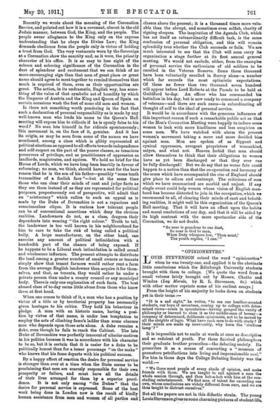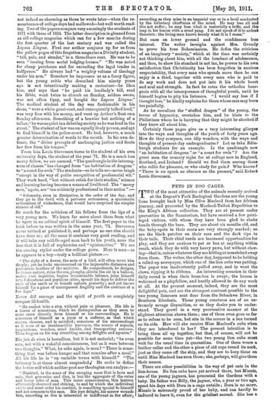"OPINIONETTES."
TOUIS STEVENSON coined the word " opinionettes' when he was twenty-one, and applied it to the obstinate little conclusions which the Edinburgh University students brought with them to college. [We quote the word from a small volume lately brought out by Messrs. Chatto and Winans (Lay Morals, by R. L. Stevenson, 6s.) which with other matter reprints some of his earliest essays.)
From the height of his majority he looks down on students yet in their teens :—
"It is a sad sight," he writes, "to see our heather-scented students, our boys of seventeen, coming up to college with deter- mined views—roues in speculation—having gauged the vanity of philosophy or learned to shun it as the middle-man of heresy—a company of determined, deliberate opinionists, not to be moved by all the sleights of logic. What have such men to do with study P If their minds are made up irrevocably, why burn the 'studious lamp ' ? "
It is impossible not to smile at words at once so descriptive and so redolent of youth. For these finished philosophers their graduate brother prescribes—the debating society. He prescribes it as a means of converting a " museum of premature petrifactions into living and impressionable soul"
For him in those days the College Debating Society was the world:— " We there meet people of every shade of opinion, and make friends with them. We are taught to rail against a man the whole session through, and then hob-a-hob with him at the con- cluding entertainment. We find men of talent far exceeding our own, whose conclusions are widely different from ours, and we are thus taught to distrust ourselves."
But all the papers are not in this didactic strain. The young Louis Stevenson gives us some charming pictures of student life,, not indeed so charming as those he wrote later—when the re- membrance of college days had mellowed—but well worth read- ing. Two of the papers compare very amusingly the students of 1871 with those of 1824. The latter description is gleaned from an old college magazine which ran for a few mouths during the first quarter of the last century and was called the Lapsus Lingua'. First our author conjures up for us from the yellow pages of this forgotten magazine a Divinity student, " tall, pale, and slender," in a threadbare coat. He was to be seen " issuing from aerial lodging-houses." "He was noted for cheap purchases and for exceeding the legal tender in halfpence." He always had " a weighty volume of theology under his arm." Somehow he impresses us as a fancy figure, but the young critic who described him ninety years ago is not intentionally making a caricature—he likes him, and says that " he paid his landlady's bill, read his Bible, went twice to church on Sunday, seldom swore, was not often tipsy, and bought the Lapsus Lingua?."
The medical student of the day was fashionable in his dress, " wore a white great-coat, and consequently talked loud," was very free with his money, and went up Arthur's Seat on a Sunday afternoon. Something of a brawler but nothing of a talker," he was as quiet in a debating society as be was loud in the street." The student of law was an equally lively person, and apt to find himself in the police-court. He had, however, a much greater determination of words to the mouth. In his own de- fence, the " divine precepts of unchanging justice and Scots law flow from his tongue."
From him Louis Stevenson turns to the student of his own university days, the student of the year '71. He is a much less
merry fellow, we are assured. " The quadrangle in the interreg- num of classes "has changed from "an habitation of dragons" to " a court for owls." The students—so he tells us—never laugh "except in the way of polite recognition of professorial wit." They work hard, " but without relish for their studies," science and learning having become a means of livelihood. The " merry men," again, are " too evidently professional in their antics " :—
" Solemnity, even in dissipation, is the order of the day, and they go to the devil with a perverse seriousness, a systematic rationalism of wickedness, that would have surprised the simpler sinners of old."
So much for the criticism of his fellows from the lips of a very young man. We learn far more about them from what he wrote in no critical spirit of himself. The first paper in the
book before us was written in the same year, '71. Stevenson never revised or published it, and perhaps no one else should have done so ; all the same it contains very good reading, and it will take any middle-aged man back to his youth, none the less that it is full of sophistries and " opinimettes." We see the coming stylist under the college gown. Here is man—as he appears to a boy—truly a brilliant picture :—
" The sight of a flower, the note of a bird, will often move him deeply ; yet he looks unconcerned on the impassable distances and portentous bonfires of the universe. He comprehends, he designs, he tames nature, rides the sea, ploughs, climbs the air in a balloon, makes vast inquiries, begins interminable labours, joins himself into federations and populous cities, spends his days to deliver the ends of the earth or to benefit unborn posterity; and yet knows himself for a piece of unsurpassed fragility and the creature of a few clays."
Never did courage and the spirit of youth so completely conquer ill-health.
" He cannot take a step without pain or pleasure. His life is a tissue of sensations, which he distinguishes as they seem to come more directly from himself or his surroundings. He is conscious of himself as a joyer or a sufferer, as that which craves, chooses, and is satisfied ; conscious of his surroundings as it were of an inexhaustible purveyor, the source of aspects, inspirations, wonders, cruel knocks, and transporting caresses. Thus he goes on his way stumbling among delights and agonies."
His joie de vivre is boundless, but it is not material; "he even eats, nob with a wakeful consciousness, but as it were between two thoughts." What, he asks again, is man P " There is some- thing that was before hunger and that remains after a meal." All his life he is "on variable terms with himself." "The intimacy is at times almost suspended.' He seeks to define the better self which neither poet nor theologian can analyze r- " Mankind, in the sense of the creeping mass that is born and eats, that generates and dies is but the aggregate of the enter and lower aides of man. This inner consciousness, this lantern alternately obscured and Shining, to and by which the individual exists and must order his conduct, is something special to himself and not common to the race. His joys delight, his sorrow wounds him, according as this is interested or indifferent in the affair; according as they arise in an imperial war or in a broil conducts& by the tributary chieftains of the mind. He may lose all and this not suffer ; he may lose what is materially a trifle, and this leap in his bosom with a cruel pang. I do not speak of it to ardent theorists : the living man knows keenly what it is I mean."
But once on lower ground and the confidences lose interest. The writer inveighs against Mrs. Grundy to prove his true Bohemianism. He defies the criticism of an imaginary " society," which at the time was certainly not thinking about him, with all the bombast of adolescence, and then, to show his standard is not lax, he proves to his own satisfaction that Christianity has been forgotten in anxious respectability, that every man who spends more than he can enjoy is a thief, together with every man who is paid to do any work and does not put into it his whole heart and soul and strength. In fact he rates the orthodox bour- geois with all the intemperance of thoughtful youth, until he himself begins to pity his listeners. " I would say less if I thought less," he kindly explains for those whose ears may burn too painfully.
As he moralizes the "stuffed dragon" of the young, the terror of hypocrisy, overtakes him, and he hints to the Philistines whom he is harrying that they might be shocked if they knew all about him.
Certainly these pages give us a very interesting glimpse into the ways and thoughts of the youth of forty years ago, How do they compare, one idly wonders, with the ways and thoughts of present-day undergraduates ? Let us take Edin- burgh students for an example. Is the quadrangle now " an habitation of dragons " or " a court for owls " ? Are the great men the country sighs for at college now in England, Scotland, and Ireland ? Should we find them among those who milks for pleasure, or who study for gain P Who knows P " There is no epoch so obscure as the present," said Robert Louis Stevenson.









































 Previous page
Previous page